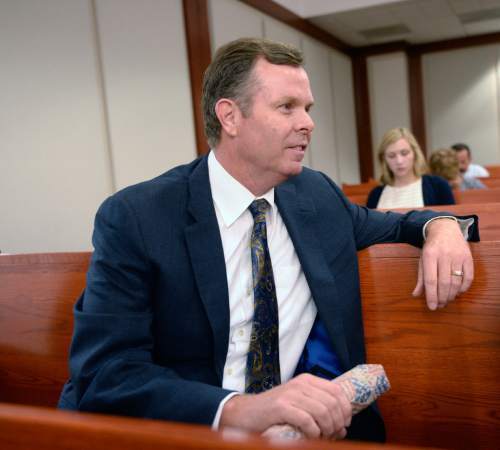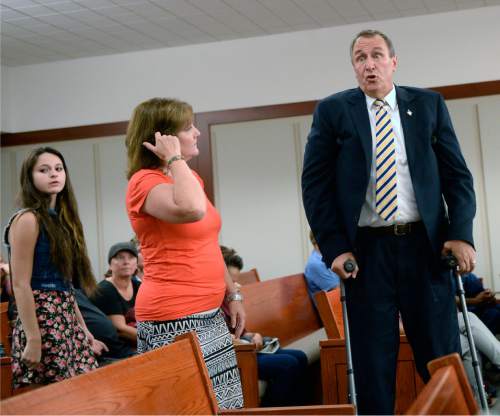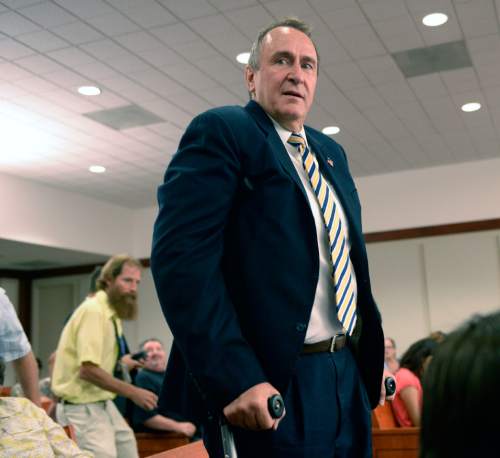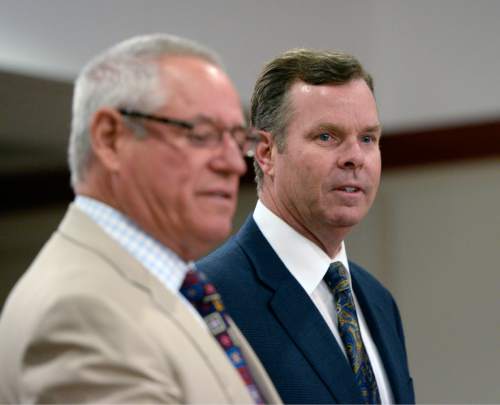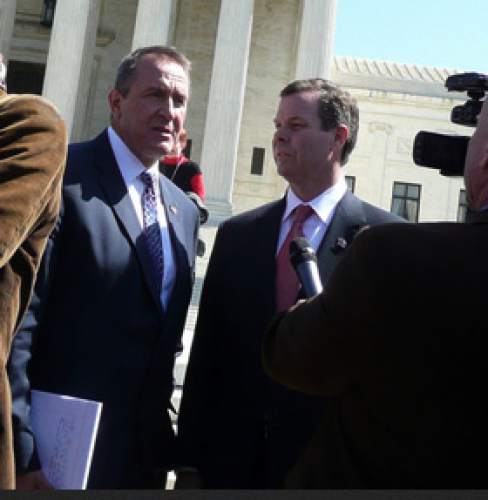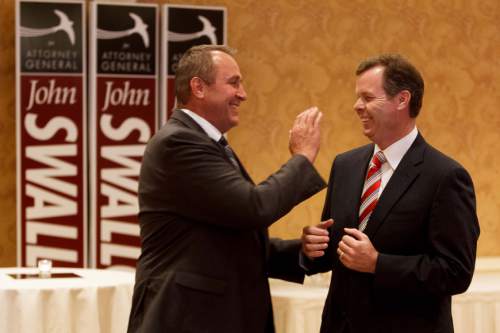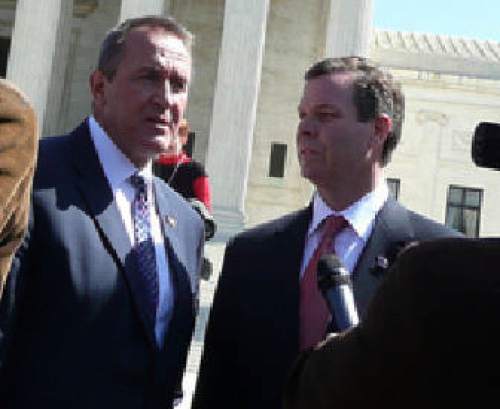This is an archived article that was published on sltrib.com in 2015, and information in the article may be outdated. It is provided only for personal research purposes and may not be reprinted.
The bunting and stage where Utah's top elected officials had taken their oaths had been packed away for less than a week when news broke that would shake the state's political landscape: Newly inaugurated Attorney General John Swallow was being accused of malfeasance on a scale never before seen in Utah.
An indicted St. George businessman was alleging Swallow used his connections to enlist help getting federal investigators off his back.
Swallow dismissed the Jan. 11, 2013, bombshell as the actions of a dishonest man desperate to stay out of prison and willing to take others down with him. But there were tapes, emails, receipts, even other accusers — all of them adding up to a story that wouldn't go away.
Now, two years later, probes by election officials, law enforcement and the Utah House have documented a string of alleged misdeeds that, as investigators put it, essentially put a "For Sale" sign on the attorney general's office door.
Laws have been changed, transparency increased and Swallow and his predecessor, Mark Shurtleff, charged.
But for all the reviews, reforms and recriminations, the most fundamental lesson to come from the still-unfolding saga is more simple: vigilance.
"We all have to be vigilant," says Attorney General Sean Reyes, who inherited the task of rebuilding the scandal-rocked office, "those who are elected to office and those who elect them."
Salt Lake County District Attorney Sim Gill, whose office is prosecuting Swallow, echoes the sentiment.
"You have to take ownership of your government. Don't abdicate it to anybody else. Political involvement and political education is the single most important check and balance anybody has," he says. "These kind of issues are the result of an unhealthy democracy. It's about taking ownership of your citizenship."
The dam breaks • Some Swallow backers brushed aside the initial allegation against the newly minted attorney general, coming as it did from Jeremy Johnson, who was staring at a federal indictment for allegedly defrauding customers of his I Works business.
But the release of an audio recording of Swallow meeting Johnson on April 30, 2012, at an Orem Krispy Kreme doughnut shop — complete with the revelation that Swallow had vacationed on Johnson's massive Lake Powell houseboat, Swallow's admission that he believed he was the target of a federal investigation, and Johnson's advice to Swallow to get an untraceable "Wal-Mart phone" — raised the stakes.
In mid-January 2013, the U.S. attorney's office in Utah acknowledged it was investigating the allegations — an inquiry later handed to the U.S. Department of Justice's Public Integrity Section.
Subsequent revelations, including the release of receipts that showed Swallow and Shurtleff had vacationed at the Southern California villa of Marc Sessions Jenson, convicted of securities violations and still under the supervision of the attorney general's office, added more fuel, as well as claims from several businessmen that they had been promised special treatment if they gave money to Shurtleff's political campaign.
A progressive group, Alliance for a Better Utah, filed an election-law complaint with the lieutenant governor's office, spurring a special investigation. Gill and Davis County Attorney Troy Rawlings also acknowledged they were investigating the former attorneys general.
By summer 2013, Utah House members were buzzing about the potential of impeaching Swallow, action never before taken against a statewide official in Utah. First, though, the House opted to create a special committee to investigate and report its findings.
Rep. Jim Dunnigan, tapped by then-House Speaker Becky Lockhart, R-Provo, to lead the probe, had some doubts about the allegations.
"Early on, my sense at the time was this is likely driven by some disgruntled people who were seeking retribution or to advance a political agenda," the Taylorsville Republican recalls.
The committee hired one of the top investigative teams in the country and dived into its work, uncovering rampant document destruction.
On Nov. 21, 2013, the eve of the release of the lieutenant governor's report, which found multiple violations of election law, Swallow abruptly announced his resignation, citing the personal and financial strain on his family.
The House issued a damning report in March 2014, laying out in graphic detail the misdeeds uncovered by the committee and listing multiple potential criminal violations committed in the process.
In July, after more than two years of work by the FBI and state and local investigators, the former attorneys general were arrested and charged with multiple felonies that could land each in prison for up to 30 years.
Both insist they are innocent, with Shurtleff particularly defiant.
"I have never misused or abused the public trust and I have certainly not violated any of the criminal laws of the state," Shurtleff said, accusing Gill of playing politics with his case.
The cases are winding slowly through 3rd District Court, but with two years having passed, the question remains: Could it happen again?
Changing the laws • At the end of the 206-page House report are six pages suggesting changes to state law that might prevent similar behavior in the future. Some were enacted; most were not.
"Those certainly were not recommendations of the investigative committee as far as something that should happen or necessarily even something that should be looked at," Dunnigan says. "They were just kind of a plethora of ideas that, if somebody had an idea, we put it on there."
The Legislature did respond with several reforms. Office-seekers now have to disclose more information about their personal finances — after officials learned Swallow was able to work around disclosure rules.
More information is required about income to spouses as well as money received for a period before candidates file to run.
Campaign expenditures must be itemized more fully, preventing candidates from simply making lump-sum payments to consultants, obscuring how money is actually spent.
Nonprofit organizations — such as the ones Swallow's campaign manager used to conceal contributions from the payday-lending industry and to channel funds to groups that would launch attacks on Reyes during the 2012 Republican primary — are now required to disclose money they spend on campaigns.
Lawmakers slapped a ban on elected officials or state workers "moonlighting," or doing consulting work outside the office, that might constitute conflicts of interest.
"We've made it more difficult" for such abuses to take place, Dunnigan says, "and I think the framework we've put in will help with greater openness and [reporting] the money flow."
Gill suggests other reforms may be needed. He believes that the position of top prosecutor — both at the county and state levels — should be a nonpartisan post to remove the potential for political conflicts.
"It really forces more healthy competition to occur," Gill says, "making that race more equal and competitive so it really becomes an issue of people's experience and looking at their skill set and not being affiliated with a party."
Others, including Rep. Brian King, D-Salt Lake City, continue to push for caps on campaign contributions — a battle fought and lost by reformers at the Utah Capitol every year in recent memory.
Inside the office • When Reyes rose to attorney general after being appointed in December 2013, he encountered deep distrust for the office from the public and "abysmal" morale among the scandal-weary staff.
During his first few months, he overhauled his senior staff and created an internal ethics committee. He established a public corruption unit and asked for several internal audits.
One of them, a review of the handling of the case against Marc Jenson, who had cut a plea deal with the attorney general's office under Shurtleff, concluded Shurtleff's conduct in the matter — which included vacationing at Jenson's Newport Beach villa on Jenson's dime — "defies explanation."
"When you have more accountability and internal transparency, you have more training and mentoring, you put policies in place like email-retention policies … it's just discipline you need to have," Reyes says. "That hopefully minimizes someone's ability to abuse the office, whether it's at the highest levels or anywhere throughout."
While Reyes didn't make a blanket policy during his 2014 campaign of refusing money from certain industries prone to encounters with the attorney general's office — his Democratic opponent did — he did say that he rejected some contributions form certain donors out of concern they may complicate matters after he was elected.
Thad Hall, a political science professor at the University of Utah, says heightened sensitivity to the appearance of politicians doing favors for donors — not just in the attorney general's office but across state government — is one of the major changes resulting from the Swallow-Shurtleff scandal.
"One lesson is: You've got to be careful who your friends are and you've got to be careful what you do to help them," Hall says. "I think that is something that is going to continue to get scrutiny."
It's more likely, he adds, that people in power will be reluctant to do favors for major donors, blunting the influence money has on Utah politics.
Despite the changes to the laws and the political climate, whether such a scandal happens again, Dunnigan and Reyes say, comes down to one trait: the integrity of elected officials.
"Depending on the person in office, there's always a chance someone might abuse their authority and power," Reyes says. "Having processes in place certainly helps deter that kind of conduct, but the processes are, in some ways, only as good as the people who are leading."
gehrke@sltrib.com Twitter: @RobertGehrke —
Key players
A look at 10 key individuals in the scandal. › A15


